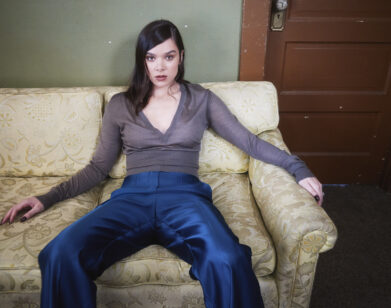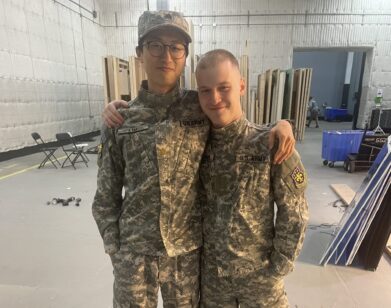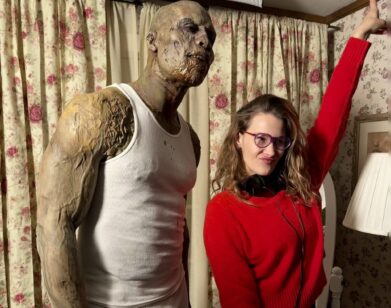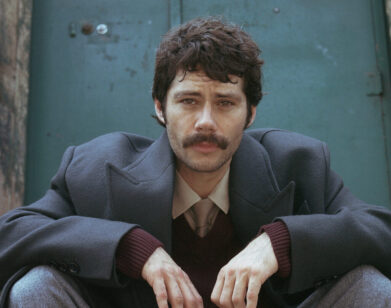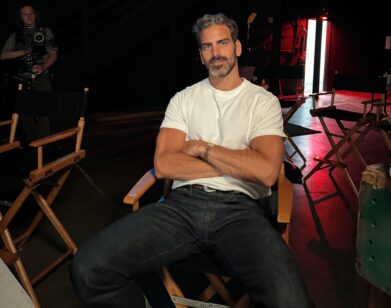What Cristina Flutur and Cosmina Stratan Found Beyond the Hills
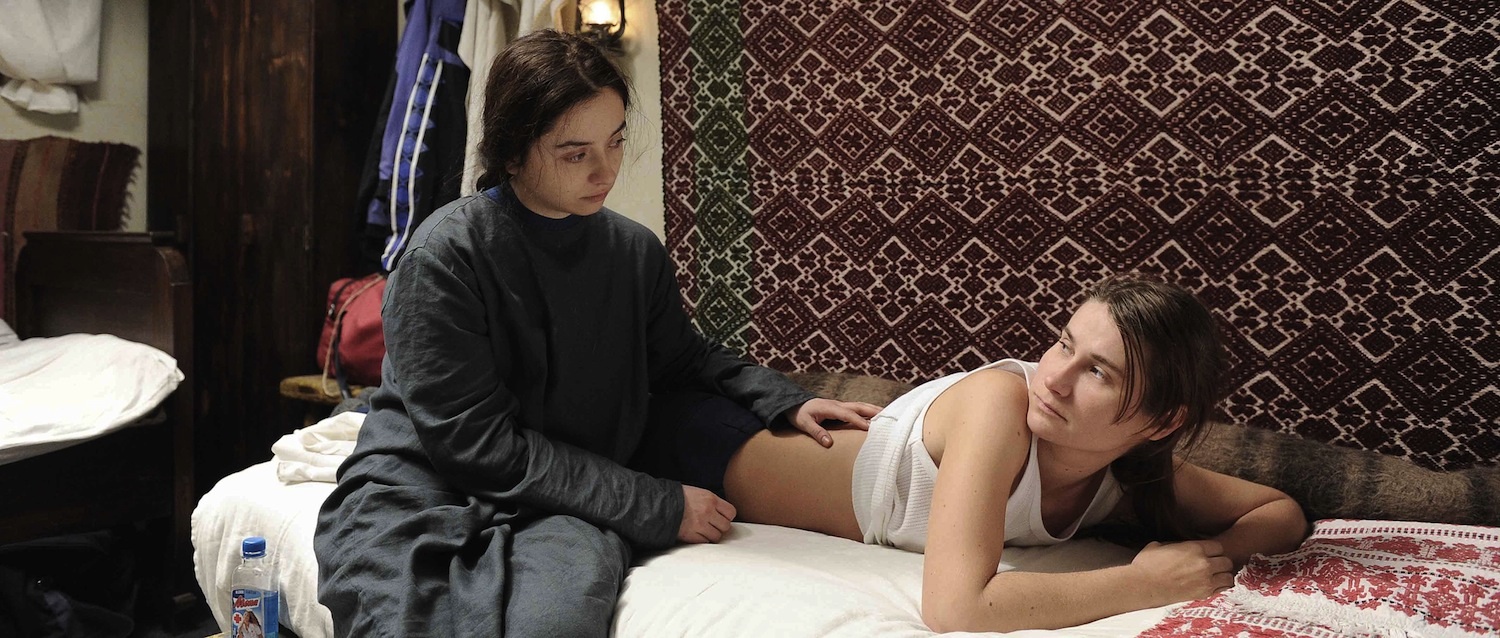
ABOVE: COSMINA STRATAN AND CRISTINA FLUTUR IN BEYOND THE HILLS. IMAGE COURTESY OF IFC FILMS
Writer/director Cristian Mungiu’s films have been a landmark of the Romanian New Wave, a pocket of cinema intrinsically attuned to the effects of generations long beleaguered by the constraints of totalitarian rule and the complex transition to democracy-driven life in modern-day Romania. His last feature, the Palme d’Or winning 4 Months, 3 Weeks and 2 Days, operated within the final years of Nicolae CeauÈ?escu’s Communist dictatorship, and his latest film, the austerely captivating Beyond the Hills, also situates itself within an authoritarian enclave—this time, an isolated Orthodox monastery in the Moldavian hills.
The film begins with meeting of Voichita (Cosmina Stratan) and Alina (Cristina Flutur), two young women who, despite having come of age in the same orphanage, have spent a number of years apart. Alina returns from a waitressing stint in Germany; Voichita is now a devout novice living with nuns, under the eye of a commanding priest and a dozen devoted sisters. While Alina’s pretense for her visit to the monastery is to convince Voichita to find work with her in Germany, she leaves three weeks later, dead, as the victim of an exorcism ritual.
The film tracks the entanglement of these two women, who share a strong, yet wavering bond that vacillates between sisterly and romantic love. While Voichita pledges her allegiance to piety, Alina acts out. Brash, bold, unapologetic, and sexually irreverent, she’s a nonconformist among a legion of true believers.
The lurid sensationalism of the premise (based on investigative novels of a 2005 event by the former Bucharest-based BBC journalist Tatiana Niculescu Bran), is tempered with a harrowing look at how an individual believes and interprets truth, and how ideology can be wielded to shape knowledge, freedom, and loyalty.
At the core of Beyond the Hills are the achingly stellar performances from both Flutur and Stratan, who jointly nabbed the Best Actress award at Cannes this past year for their efforts. Incidentally, Beyond the Hills is the film debut for both. Interview caught up with the pair to discuss their foray into acting, working with Mungiu, and the benefit of leaving questions answered.
COLLEEN KELSEY: So, starting off, I’d like to congratulate both of you on your win at Cannes.
COSMINA STRATAN: Thank you.
KELSEY: What was your initial reaction to winning?
STRATAN: “It’s not true.” [laughs] That was my initial reaction.
KELSEY: And you, Cristina?
CRISTINA FLUTUR: I didn’t have time to realize what was happening. I just took everything how it came. And reacted on the spot. So, “Oh, I have to say something. Okay. I have to go and say thank you. Okay.”
KELSEY: How does it feel now that you’ve had some time to think about it?
FLUTUR: It’s not bad. [laughs] Everything kind of changed. The reason of my life changed a bit.
KELSEY: Cosmina, this was also your first feature film experience. You began your career as a journalist, and trained as a theater actress. How was it to transition from those different areas to this film?
STRATAN: For me it was quite a long transition, because I dropped journalism when I started acting school, like five years ago. But it’s different actually, than the university where I trained for theater. If you want to know something about cinema, you have to work in order to understand the process. They’re really different.
KELSEY: How did you first get involved in the film? Did you know about Cristian’s work from beforehand?
FLUTUR: I had seen his movies before. Not all of them. Some of them. When I saw 4 Months, 3 Weeks and 2 Days, I instantly felt, this is someone I want to work with. Immediately. Like, if I will ever make a film in my whole life, it will have to be with him. This was my sensation then. It was an interesting story, great directing, great actresses. Everything was how I imagined a good film should look like.
KELSEY: How much did you two know about the actual event that took place? Was there a lot of media coverage in Romania? I imagine it would be an incredibly controversial event.
FLUTUR: It was. Actually, I didn’t know much about it. I didn’t read [about it], I only heard the story, but I didn’t want to get too much into it.
KELSEY: Cristian based the narrative off of Tatiana Niculescu Bran’s novels on the subject. Did you read those before you started filming?
FLUTUR: I just read the first book, yes. I wanted to know about the real facts. I felt like it was a sign of respect for them, because without them, we wouldn’t have had this film at all. I liked the script very much. It was very well written. It carried you along. And all the characters were interesting.
KELSEY: I wanted to talk about both of your characters, Voichita and Alina. They have a very strong intimacy, but also an unresolved tension. We learn that they’ve known each other for basically their entire lives, and there’s visibly a strong bond between them. How did you two approach getting into character? Did you prepare together? Did you imagine what their experiences were like in the past?
STRATAN: Everyone talks about this strong bond after seeing the movie. It’s actually good that this is not visible, in a way. Because the movie starts when the bond is becoming weaker and weaker between the characters. And if you feel that they have a strong bond, then it’s our job, in a way. We had to build this bond. They really had a rich past, a rich history together, but the movie starts when they kind of go separate ways. Yes, we did that, but actually not together. We did it on our own.
KELSEY: Did you work with Cristian a lot with that as well, on defining your characters?
FLUTUR: Well, I didn’t talk with him, actually. We kind of felt what it was all about, but I didn’t spend hours of talking and analyzing and getting into the character too much.
KELSEY: It was more intuitive?
FLUTUR: Yeah, it was more like this. We both felt the same way. This is amazing when it happens with the director. It’s rare.
KELSEY: How would you two define the bond that your two characters have for each other? It’s a love, but is it more friendly, or familial? It definitely can be interpreted as romantic.
FLUTUR: If you try to define it, you end up trying to name something that’s quite hard to name. At the beginning, I just was wondering what was happening between these two girls. I wanted to know the relationship; I wanted to know exactly what was happening so I could try to understand it and try to uncover it. But after a few days of trying to get some answers from Cristian, I just love the way he avoided the answers. I kind of understand that I didn’t need them anymore. In real life, you don’t know everything about the relationships you are involved in, so you are a bit insecure. Not always, but there are some moments when you are like this. It’s not right for an actor to try to find out everything, like on a piece of paper having everything checked, “I know this. I know this.” It’s frustrating to start without knowing these answers, but it’s more challenging.
KELSEY: Cosmina, Voichita has to decide whether her loyalties are to Alina or to the monastery where she’s cultivated a new life. And she doesn’t really seem to be very vocal. Everything seems to be internalized. Do you think that’s a big part of her personality and why she ended up living in that situation?
STRATAN: Yes, definitely. It’s a way of living. At first, I thought, “I understand everything. And I understand the way she acts.” But after a few weeks of shooting, I didn’t understand it anymore. I had to really connect with the situation in order not to only expose the facts, but to live inside of this character. Cristian really helped me to stay on the path. I really wanted to act and make a choice and save Alina in a way, and save myself in a way. But he really kept me on that ambiguous path.
KELSEY: It seems that Alina will do anything, including embracing this new lifestyle, to be with Voichita. Do you think so?
FLUTUR: If it seems so, probably it is so. How can you know everything about a character? Yes, she seems very much into the story. But this bond that we talked about, at the beginning of the story, the bond is still there, it’s not the end. That’s why she’s coming, and you can see her longing for years. It’s there. What happens is that Voichita is cold, and Alina is just hitting her head on this wall again and again. And she doesn’t know what’s happened. Where did it go, what we had? How can you change? How can you be somebody else? This is something she doesn’t understand. That’s why she’s not leaving the monastery, because it’s a truth that she cannot accept. And she doesn’t understand this kind of coldness from someone she still loves so much.
KELSEY: And you feel that for Voichita, it’s over between them?
STRATAN: No, I think she’s too young to put an end to things in her life. I just kept looking for the answer, “What’s wrong with this girl?” The first answer that came into my mind, and I think it’s the right one, she’s too young to understand what’s happening, even though she’s not 13 or 12. She’s not ready for her life. She has a really tough life. And she’s not prepared to deal with that. So she does not deal with her life, except at the end of the movie. When something happens and she begins to question herself, whether she’s on the good way or not.
KELSEY: A lot of the themes that the movie brings up are responsibility, choice, and commitment—whether it’s to a religious lifestyle, or to your friend, or to your family. Voichita’s indifference is actually a huge factor as to why Alina ends up the way that she does.
STRATAN: Actually, I don’t know if it’s indifference. She’s quite hard to understand. If you think about it that she cannot decide, she cannot make up her mind. She leaves everything in an ambiguous point of view.
FLUTUR: I think she has inner conflicts so overwhelming that [they] keep her away from action. With Alina, she’s not active. But I don’t think it’s indifference. She still feels something, but she still needs safety more than anything. Maybe that’s the reason why she got close to Alina in the first place, because she needed this protection. She always needs to cling onto somebody, or structure, something that could give her ground. Maybe she’s not grounded enough, and she needs somebody else next to her to be grounded.
BEYOND THE HILLS IS OUT IN LIMITED RELEASE THIS FRIDAY, MARCH 8.

